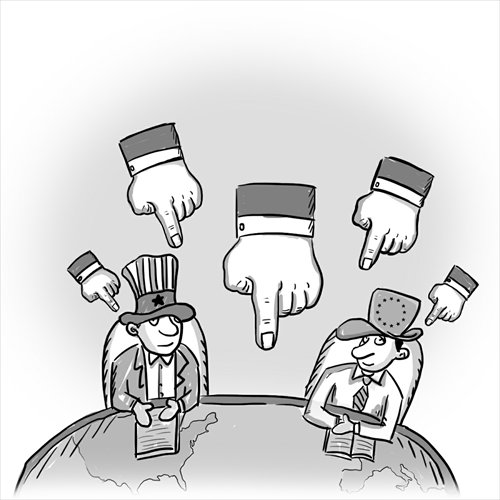Secrecy gives TTIP, TPP critics reason to worry

Illustration: Chen Xia/GT
Right now, two major world trade agreements are being negotiated behind closed doors. Both will subvert the laws and sovereign rights of signatory nations, further drive the jackboot of corporate dominance into the soft skin of the citizenry, and consolidate a world economic order that makes US geopolitical and business paramount.
At least, that's one narrative surrounding the Transatlantic Trade and Investment Partnership (TTIP) and the Trans-Pacific Partnership (TPP).
But proponents of the deals have so far done little to dispel the claims that have conspiracy theorists on edge. Supporters have instead projected an arrogance that only confirms the worst fears of their critics.
The TTIP, currently being negotiated between the EU and the US, is billed as the biggest trade deal in the world on the European Commission's website. It says the deal aims at cutting tariffs across all sectors and reducing barriers to trade.
Meanwhile, the TPP involves the US and 11 other Pacific Rim governments, including Australia and Japan, while notably excluding Russia and China. It would cover around two-fifths of world trade. The US is pressuring for completion by the end of this year.
The two agreements have many things in common. Most alarmingly are their secrecy and lack of public consultation.
All public knowledge of what's in the agreements is currently based upon leaked documents and the vague pronouncements of persons privy to the deals. This is because all negotiations are conducted behind closed doors, with those taking part required to sign nondisclosure agreements.
This means countries will find themselves signed up to the deal without the chance of informed public debate.
Meanwhile, hundreds of lobbyists and corporate board members from the US have been given clearance to read and serve as consultants in the drafting of the deals.
This latter fact feeds into claims that the deals are actually weighted heavily toward the interests of corporations, particularly those from the US, and aimed at giving them further access to developing markets on terms that are hugely advantageous to them.
One of the most controversial policies to have emerged is the "investor-state dispute settlement" system. This establishes a supposedly independent panel that will allow corporations to challenge the policies of signatory companies.
The system would override the legal systems of signatory countries and is not open to appeal. Each case is adjudicated by a panel of just three people, and their rulings are legally binding.
The system has seen a tobacco manufacturer sue Australia after the country ruled that cigarettes should be sold in plain packaging, energy companies sue Argentina after it froze energy bills, and a US drug company sue Canada for revoking two of its patents. Leaving countries open to billion-dollar cases, strengthening the system could have a chilling effect on legislation aimed at protecting health and the environment.
Another criticism of the deal is that it promotes US dominance, and is a bulwark against China and Russia. It comes at a time when Chinese export competitiveness is waning, and China is seeking to assert itself as a more active international agent. However, the TPP will see the rest of Southeast Asia gain easier access to the US market and preferential treatment when dealing with the US and other signatories. This could reduce demand for the yuan and put further downward pressure on Chinese exports.
Meanwhile, the US dominates negotiations, insisting that new entrants who wish to join have no right to see the text and, if they do join, cannot reopen already-agreed upon points for discussion.
Of course, those behind the two deals could be operating with a complete lack of self-interest, wanting only to see global trade flourish for the benefit of all. However, their complete inability and unwillingness to effectively address these concerns makes this hard to believe.
For example, an insultingly glib document put out by the European Commission entitled "Incorrect claims about investor-state dispute settlement" fails to address the main issue that arbitration is being conducted without recourse to appeal; while a recent attempt by Ken Clarke, the UK's former chancellor of the Exchequer, at rebutting a critique of the TTIP by The Guardian journalist George Monbiot resorted to mudslinging.
Unless the US and the other governments involved open these documents to full public scrutiny before they are signed, the stench of conspiracy will remain.
The author is a freelance writer. adam.skuse@yahoo.com bizopinion@globaltimes.com.cn.